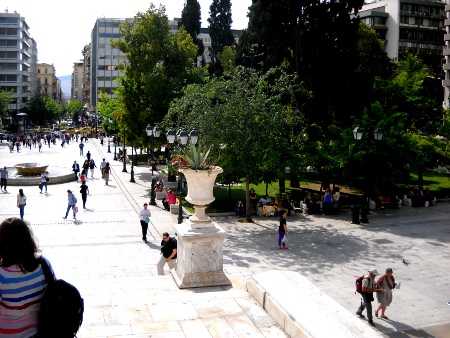On this page you will find an overview of the city of Athens. Other subpages in this travel guide cover specific topics about Athens: Sights in Athens, Getting to Athens and Public Transport in Athens.
Online tickets for Athens (entrance tickets, etc.)Many tourists now buy some tickets for Athens online in advance. The queues on site are often long, tours only take place on certain days. Below we have selected some good and important tickets for you: 1. Good Acropolis tour: More information and booking 2. Acropolis ticket only by email: More information and booking 3. Acropolis Museum entrance tickets for only 7 euros: More information and booking 4. Day tour from Athens to Delphi: More information and booking 5. Hop-on / hop-off bus city tour of Athens: More information and booking |
 Image: Michalis Palis – Fotolia.com
Image: Michalis Palis – Fotolia.com
Athens is by far the largest city in Greece. Around five million people live in the greater area of the capital. This means that almost every second inhabitant of the state of Greece lives in and around the capital. The port city of Piraeus is an independent city, but is completely connected to Athens. The Greeks call the greater Athens area Attica.
Tip: Book hotels & holiday apartments cheaper at Booking.com: Click here
If you come to Athens for the first time from Central Europe, the city seems chaotic and loud. Until a few years ago, Athens was also very dirty, but this has improved significantly. The millions of cars are one of Athens’ main problems. Sitting in traffic jams is a daily experience for many Athenians. There are only three subway lines in Athens, far too few for such a large city. The construction of tram lines has improved the situation somewhat in some parts of the city. New subway lines are planned, but in times of the worst economic crisis in Greece’s modern history, it is unclear whether and when the money will be available.
Orientation in Athens: The center of modern Athens is Platia Syntagma (Constitution Square).

Monastiraki Square is often described as the second most important square in Athens. The two squares are connected by Ermou Street. This is the most important pedestrian zone and shopping street in Athens. The old town of Plaka is a few hundred meters south of Ermou Street. Even further south, the steep climb leads up to the Acropolis. On Syntagma Square is the Greek Parliament and behind it is the most beautiful park in the city, the National Garden. Piraeus and the port for most ferries is about seven kilometers southwest of the center of Athens.
Safety Athens: The economic crisis is currently dominating the media and the people. Despite all the problems, Athens is still a relatively safe city. Crime against tourists is much lower than in most other cities in Europe with a population of one million. Theft or even robbery against tourists is rare. However, the mood has generally become tougher in recent years due to the hundreds of thousands of illegal immigrants who have to survive without benefits from the Greek social system. The focus of (drug) crime is, for example, the central Omonia Square (and especially the streets north of it) and parts of the port city of Piraeus. It is best to avoid these areas – especially at night.
Almost all of Athens’ sights are in the city center north of the Acropolis of Athens. They are not too far from each other, you can walk. There is a subway from the center to the port of Piraeus, as well as to the airport. Hotels and guesthouses can be found all over the city. The cheapest place to stay is in the guesthouses around Omonia (be careful: many are flophouses). The best area to stay in Athens is probably the old town of Plaka under the Acropolis. Accommodation there is a bit more expensive than in other parts of the city, however.
I am often asked about prices in Athens. Athens is not that cheap. Taverns, cafes and restaurants in particular have become more expensive recently. If you avoid the tourist areas like Plaka, you can still eat well in Athens for 12-15 euros or drink a coffee for 1.50 euros. Rooms in cheap hotels can be found outside of the absolute peak season for as little as 25 euros. Of course, as in every major European city, there is hardly any upper limit. In private youth hostels, you can stay in dormitories for as little as 12 euros. Public transport is much more expensive than before the crisis, but still cheaper than in Germany. A single journey on the subway costs 1.40 euros (except to the airport), and a 24-hour ticket costs 4 euros. The latter is recommended and is also valid for buses and trams. Anyone who goes shopping in Athens (clothing, jewelry, electronics, etc.) will feel that the prices are a bit higher than in Germany. VAT has been increased several times in recent years.
➔ Book cheap hotels in Greece for 2025 now
Do you have feedback, an addition, found an error or a comment? Send us an email to: mail@griechenland-insel.de